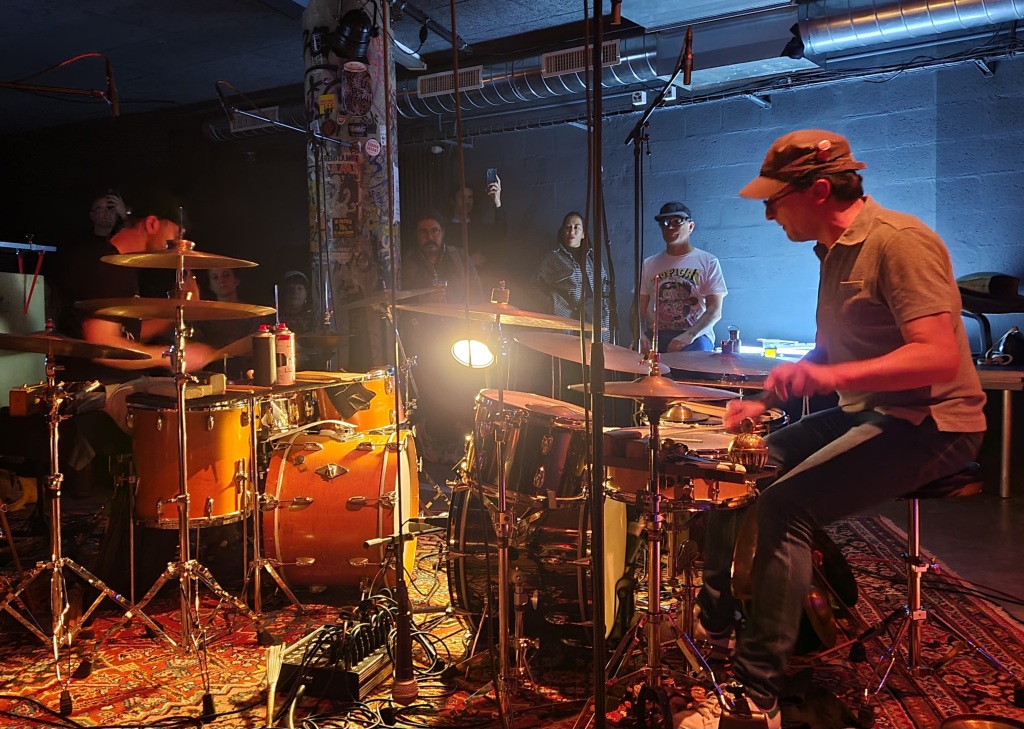Here was a classic cave12 concert – strange, baffling and hugely entertaining. Consisting of drummers Nicolas Field and Alexandre Babel, the duo of Buttercup Metal Polish is celebrating its 20th anniversary this year. What better reason, then, to perform a special anniversary concert. This was my first visit to cave12 since the pandemic, and if I didn’t know quite what to expect from the event, it turned out to be an evening rich in fun and surprises. Babel was new to me, but I’d seen Field in action way back in 2018 with his N-Ensemble.
It was immediately evident, from the moment you entered the performance space, that this was not going to be an ordinary concert. The low-rise stage was empty, save for a few chairs and scatter cushions, while Field and Babel’s drumkits were placed facing each other on the floor. Meanwhile, four microphones were strategically placed at points around the room, clearly for the use of the “special guests” whose presence had been advertised.
It’s not often that you’re told in advance exactly how long a concert will last, but as part of his traditional pre-show announcement, cave12 MC Sixto had specified that the performance would last exactly 70 minutes. I couldn’t resist setting off my stopwatch and glancing at it occasionally, just to keep an eye on the passing of time, although the passage of those 70 minutes would in any case loom large in the concerns of at least one of the four guest vocalists.
For the first fifteen minutes or so, however, Field and Babel were left to their own devices. Perfectly attuned to one another, the two drummers used every available object to construct a dizzying array of percussive sounds and mazelike polyrhythms. The dynamic shifts in the music – from loud to quiet, intense to playful, spare to clattering – drew in this listener inexorably, left slack-jawed at the musicians’ extraordinary agility and dexterity.
Things started to get interesting at this point, as the four vocalists/observers began to make their presence known in various corners of the room. The deal here seemed to be that they were there to keep a watchful eye on Babel and Field, amplifying and commenting on the music as it unfolded. Of the four, the one who made by far the strongest impression was Joke Lanz, the veteran Swiss provocateur whose principal project, Sudden Infant, also features Babel on drums. On this occasion, Lanz kept up a steady stream of invective in English, French and German. Whether counting down the number of minutes remaining for the duo to play or announcing that he would “let the boys play their drums”, there was something uneasy, almost Kafkaesque, about Lanz’s increasingly harsh interventions.
Elsewhere, American artist and noise musician Fritz Welch complemented Lanz’s commentary with caustic words of his own. I was less convinced by the performances of Maarten Seghers and Catherine Travelletti, who traded Lanz’s transgressive and confrontational position for a more self-consciously physical and absurdist approach. Reciting aphoristic texts while roaming the room in wildly expansive movements and gestures, I felt that Seghers and Travelletti’s whimsical contributions detracted from the overall impact of the piece.
The most striking thing about the performance, though, was that despite all that was unfolding around them, Babel and Field never reacted to the commentators’ presence. Sealed in some hermetic zone of isolation they continued to play, their improvisations sustained by creative dialogue and telepathic understanding. It was as if they were Lanz’s subservient playthings, being unwillingly coerced into ever more desperate bursts of activity. As the allotted time wore on, Lanz’s tone became more hectoring and bullying while the drumming reached new heights of intensity. On the stroke of 70 minutes, the music stopped. Were Field and Babel released from Lanz’s grip, or had they somehow escaped from it?

